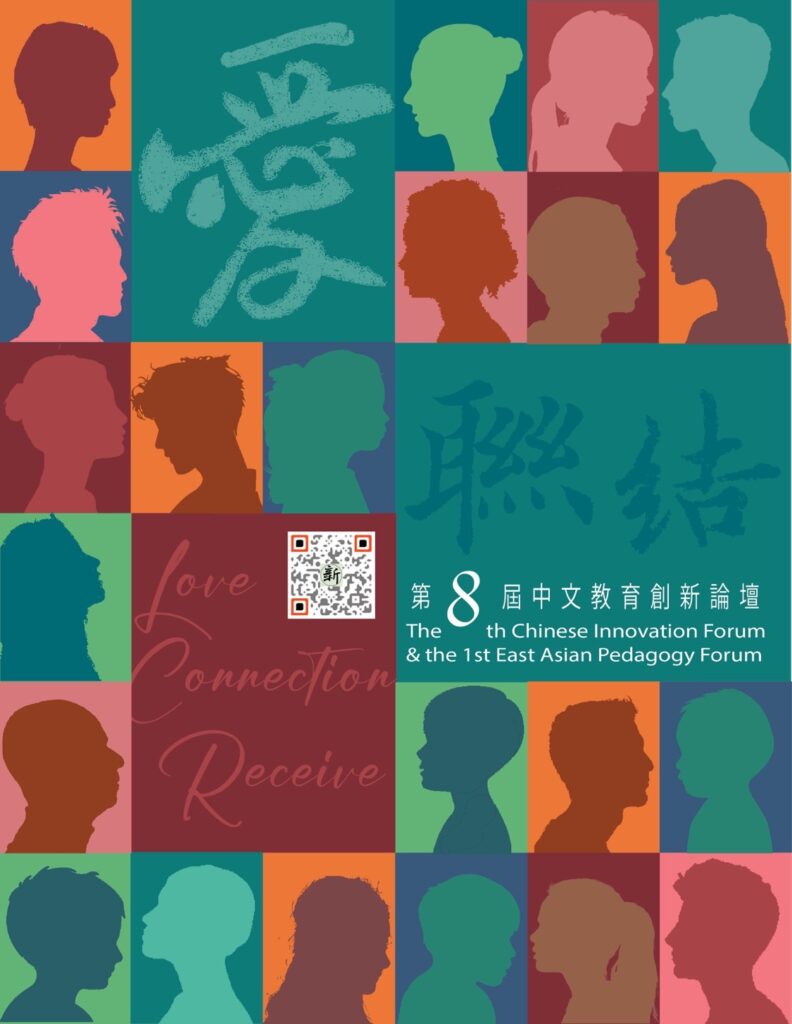The 8th Forum Program | 2024
THE 8th CHINESE INNOVATION FORUM
中文教育創新論壇 | 中文教育创新论坛
小型互動模式的國際年會及網.上資訊
The 8th Chinese Innovation Forum is designed to maximize opportunities for participants to meet and network with other K-16 Chinese language educators. Participants will have opportunities to showcase their teaching, student work, research results, published work, technology use, advocacy strategies, and other innovative projects. For more information, visit the Chinese Innovation Forum website at https://chineseinnovationforum.org/.
Our forum this time includes three activities: a school visit on Sep. 20, a teaching workshop on Sep. 21, and the Chinese Innovation Forum on Sep. 22. If you are interested in the Campus Visit, please go to https://reurl.cc/oRArYM. Campus Visit RSVP by August 15th, 2024. If you are interested in the workshop, please go to https://reurl.cc/XGyqQ0.

Registration
EARLY BIRD registration fee is $75 before Aug 31st, 2024. The regular price is $85. This fee includes lunch but does not include the workshop fees.
1. Registration is now open online at https://reurl.cc/aqALgZ. If you are CLTA-SC members, Please visit https://forms.gle/sv74CFrFrSDCy29D9 for the 9/22 forum registration6
2. If you want to share your teaching idea during the Trade Fair (創新桌子), the registration is now open online at https://forms.gle/jhRaMNwkwPQ4Jrhg6–
KEYNOTE SPEAKERS
1. Hong Gang Jin, Hamilton College.William R. Kenan Professor of East Asian Languages and Literature/Director Associated Colleges in China (ACC) Emerita (retired)
Topic: Incorporating Neurocognitive-based Social L2 Learning in L2 Online & Offline Instruction
基于脑神经认知研究的 “二语社交学习”理论对二语线上、线下教学的启示
Abstract
基于脑神经认知研究的“二语社交学习模型”( social second language learning/SL2)近期得到众多脑成像实证研究数据的支持,对线上-线下二语习得及二语教学研究有着极其重要的指导意义。这一学习模型将二语习得从单一的左脑语言加工扩展到左、右脑兼用的社交语言习得,将人、物质、行动、情感、视空间感知等相关的“社交互动”整合到二语学习中。该模型及其实证研究揭示出两个重要习得规律。首先,大脑左右两侧在语言信息加工中合作并用,即右侧社交学习与左侧语言加工缺一不可。其次,具有社交成分的二语学习过程可以导致正向的脑结构变化,有效促进习得。本报告将围绕二语社交学习理论,从三个方面进行细节讨论。第一,介绍二语社交学习模型的基本概念及其语言教学应用意义;第二,通过脑成像实证研究实例说明二语社交学习研究成果如何支持二语社交学习理论;第三,讨论二语社交学习理论对二语教学的启示,在此基础上,提出三个基于脑神经认知研究的二语教学策略。
Recently the neurocognitive-based social L2 (SL2) learning model has received strong support from neuro-imaging studies in second language acquisition for its efficacy and significance. This model expands L2 learning to have a social component and emphasizes “social interaction”, where learners can interact with objects and people, perform actions, and receive, use, and integrate perceptual, visuospatial, and other sensorimotor information. Such a model reveals two important processes in both left and right brain regions working together and demonstrated positive brain changes along with enhanced behavioral
outcome as a result of SL2 learning (Jeong & L1, 2020; Liu et al, 2020, Lan et al., 2015, Zhang et al.,
2020, among others). In this presentation, I will first introduce the core concept of the social L2 learning model based on its principles and research. I will then use the recent brain-imaging studies to demonstrate how and where the human brain can be impacted by SL2 learning. Finally, on the basis of the theoretical model, I will discuss the implications of SL2 in second language teaching and propose three neuro-cognitively sensitive pedagogical strategies for L2 online & offline instruction。
2. Mari Noda. The Ohio State University. Professor of East Asian Languages and Literature/Director SPACE (Summer Programs East Asian Concentration.
Topic: “Love kills” or love connects? – Performance to sustain learner motivation
好きこそものの上手なれ- パフォーマンスで維持する学習者のモチベーション
Abstract
The main argument for this presentation is that performance in a realistic cultural context serves as a strong motivator for foreign language learning. Performance is a situated event that is defined by the specified contextual elements and the script, which in turn includes both linguistic acts as well as physical movements. Performance practice entails establishing the contextual elements and making them available for the actors to see and process readily. Departing the default situation of a foreign language classroom for performance rehearsal pays off not only in improving the level of language use and socialization. In turn, it contributes to sustaining learner motivation, because the more you socialize in the language, the more you have access to language-learning opportunities. The experience of performances builds personal memories of that experience, what Roger Schank calls stories. Developing stories of participation in a new culture is challenging. At the same time, it is thrilling and highly rewarding. Through these stories, we build our multiple personae, the aspects of ourselves that we present in more learning situations to make meaningful connections with members of the target culture.
Conference Host: Bian Fang (Mahwah High School, New Jersey)
Sep. 22 (Sunday) PST Conference Schedule
8:30-8:50 Check-in
9:00 -9:10 Opening Remark
9:10-9:50 Professor Hong Gang Jin
9:50-10:05 Q & A
10:10-10:50 Professor Mari Noda
10:50-11:05 Q & A
11:10-12:10 Lunch & Mingle
12:15-12:45 Round Table
1:30-2:00 Trade Fair Preparation time
2:00-3:30 Various Presentations at the Trade Fair
3:30-4:00 Closing
Housing Information for the 8th Chinese Innovation Forum
If you are attending the 8th Chinese Innovation Forum and require accommodation, we have arranged discounted housing options for participants. Please find the details below:
| Group Name | The 8th Chinese Innovation Forum |
| Group Link | GROUP LINK |
| Phone Number | 213-748-4141 and mention the group name |
| Payment | All guests pay on their own for all charges |
| Overnight Parking | Overnight parking is available at $40 per night, all guests pay for parking on own |
| Cutoff Date | The last day to make reservations under the group rate is: 09-04-2024 |
Workshop Sponsors:
Chinese Language Digital Teaching Association
Chinese Language Teachers’ Association of Southern California
Middlebury Institute of International Studies at Monterey
Real Asia and Mimir
Taipei Economic and Cultural Office in Los Angeles
Trinnovation Space
University of California, Santa Barbara
University of Southern California
Wisdom Culture and Education Organization